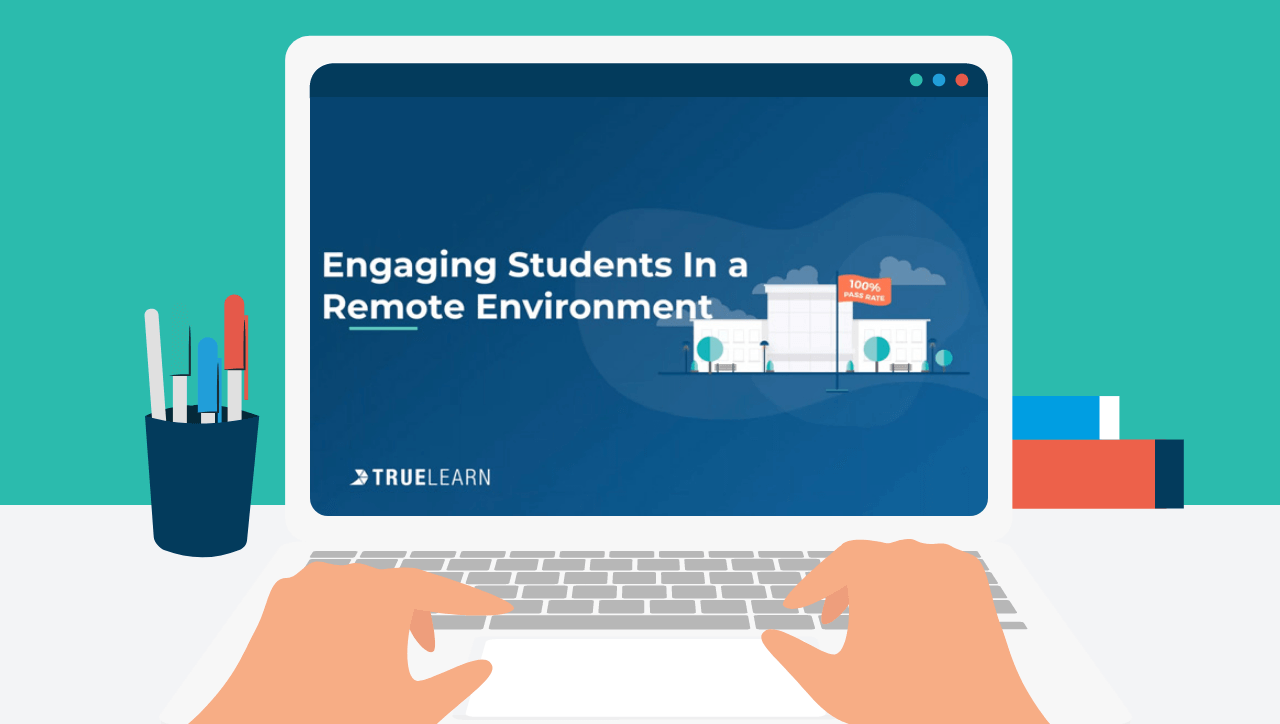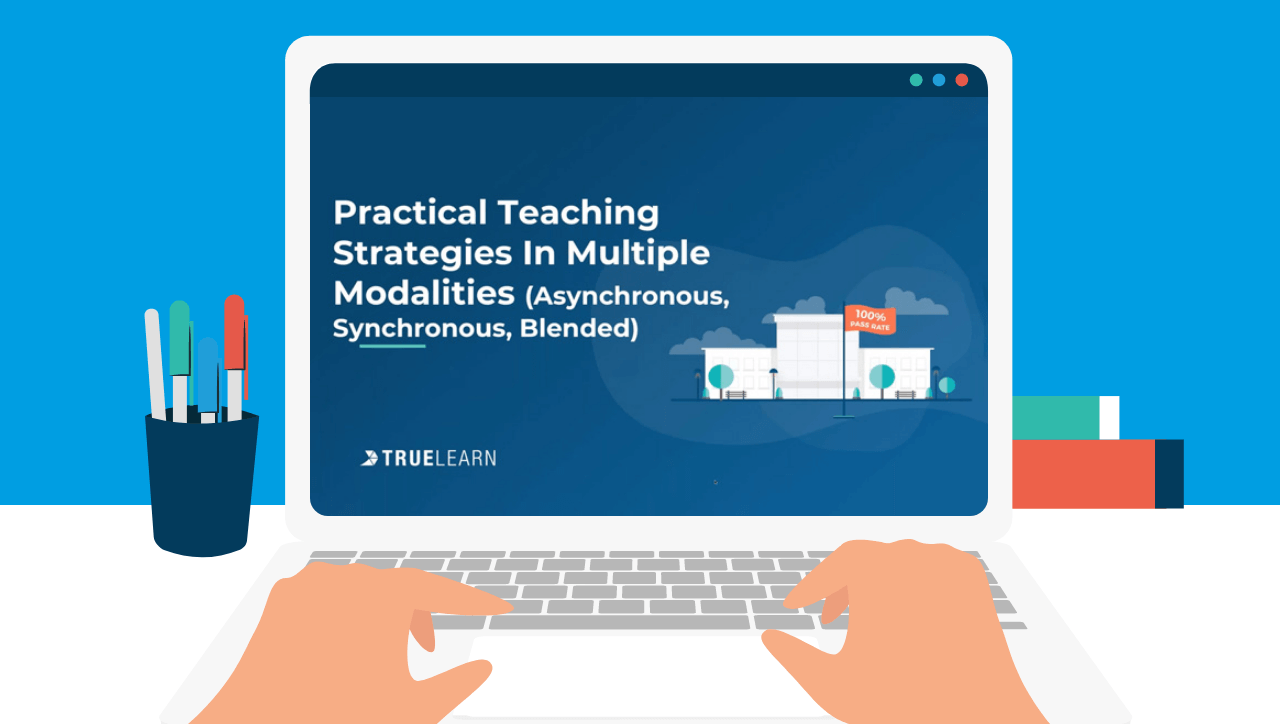Unlock Unlimited Long-Term Memory—Enhance Learning Capabilities and Optimize Knowledge Retention and Recall

To reduce cognitive load and optimize learning and developing higher-order thinking, the Cognitive Load Theory recommends leveraging short- and long-term memory appropriately. Working or short-term memory, as the name suggests, is ideal only for remembering a small amount of information for a short time. In healthcare education, learners face a complex and demanding curriculum and cannot rely on short term memory alone to get them to the finish line, pass high-stakes exams, and ultimately deliver safe and effective patient care.
They must leverage their long-term memory and utilize its infinite capacity for information storage to build knowledge frameworks that allow critical thinking and problem solving to occur. Long-term memory can support a vast amount of knowledge, enabling the learner to retain the information for an extended period and recall and apply it with ease when needed—such as when sitting for licensure and certification exams, and in clinical practice.
As educators, you can help your learners unlock the limitless potential of their long-term memory by applying learning science strategies that have been proven effective by recent cognitive research.
Explore the benefits of retrieval practice, spaced repetition, and interleaving and discover how these techniques help healthcare learners develop successful lifelong learning habits and maximize long-term memory, recall, and critical thinking.
Practice Retrieval
This learning technique involves recalling information previously acquired, making learners extract knowledge from memory, which requires more cognitive effort than passive forms of learning. Studies comparing practice retrieval with methods like reviewing lectures, study guides, and re-reading texts found retrieval practice to be the most powerful strategy for cementing long-term learning.1 There is also evidence that it supports higher-order thinking—learners who use this method perform better on complex tasks and demonstrate improved metacognition.2
Here are three examples of practice retrieval that educators can easily incorporate into their lessons:
| Examples | Description |
|---|---|
| Low-stakes quizzes (LSQ) | Using quizzes as a learning or practice tool rather than for a grade—hence, low-stakes—allows learners to focus on the content they have covered and practice recalling information from memory. LSQ thus can help both educators and learners observe whether the information taught has been understood or not: if the learner struggles to answer the questions, educators will know that they need more guidance or attention and can then provide corrective feedback to help bolster the learner’s knowledge retention.3 Using LSQ also encourages learners to self-regulate their studying, enhancing metacognition, and maintaining a solid foundational knowledge base.4 |
| Think-Pair-Share (TPS) | This cooperative learning activity works for classrooms of any size and for any subject. Educators pose an open-ended question and learners first think to themselves before discussing their answer with another learner (pair), then share with the class. Because learners are allowed time to think critically and “retrieve”, they can formulate high-quality responses.5 Group learning, in low-stakes environments can improve the overall understanding of the content covered in the entire class.6 |
| Brain Dumps/Free Recall | Learners are given a set period of time to write down everything they know about a chosen topic.7 Utilizing the TPS method offers the learner an opportunity to reflect and retrieve information they were previously exposed to. This act of retrieval not only reinforces what the learners perceive they know, but also helps to identify potential knowledge gaps or areas where they may be confused or uncertain of the concept. |
Spaced Repetition
This learning strategy involves exposing learners to similar material regularly, and as concepts are retained, increasing the spacing to longer intervals. Based on Hermann Ebbinghaus’ 1885 research on the spacing effect that found when repetitions are spaced in time, they produce stronger memories than repetitions that are closer in time.8 As a result, learners can better embed the knowledge into their long-term memory and by continually reinforcing through the retrieval method, learners optimize study time, reducing the need to re-learn content. Instead, they can focus more on learning more complex concepts and leveraging activities that help develop higher-order thinking and knowledge application.9
One critical application of spaced repetition is for circumventing what Ebbinghaus termed the “Forgetting Curve”10 He hypothesized that no matter how well a student learns and remembers, memories can and will fade over time. This is an important aspect of the learner’s memory-building process and spaced repetition helps overcome the effects: When course content is reviewed over increasing intervals of time, the curve lessens and the information gets committed into long-term memory.
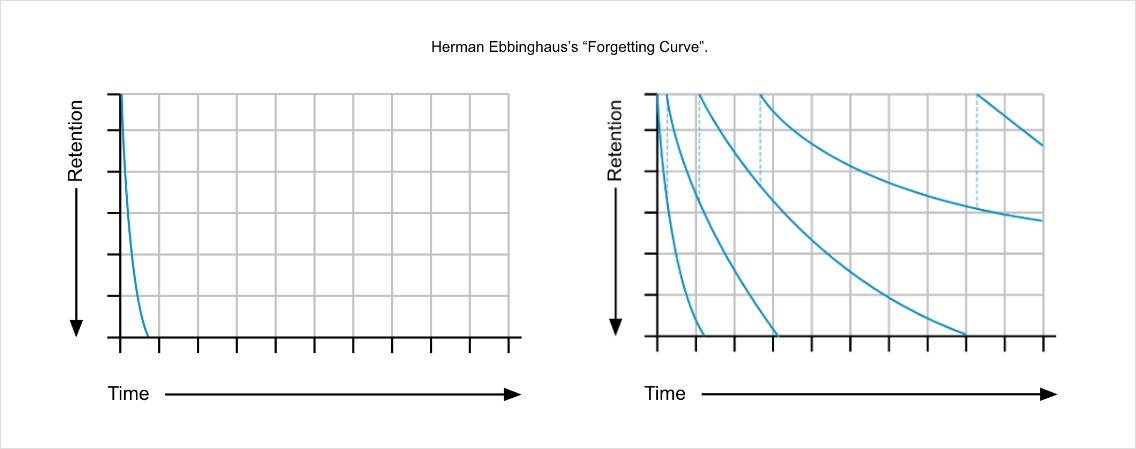
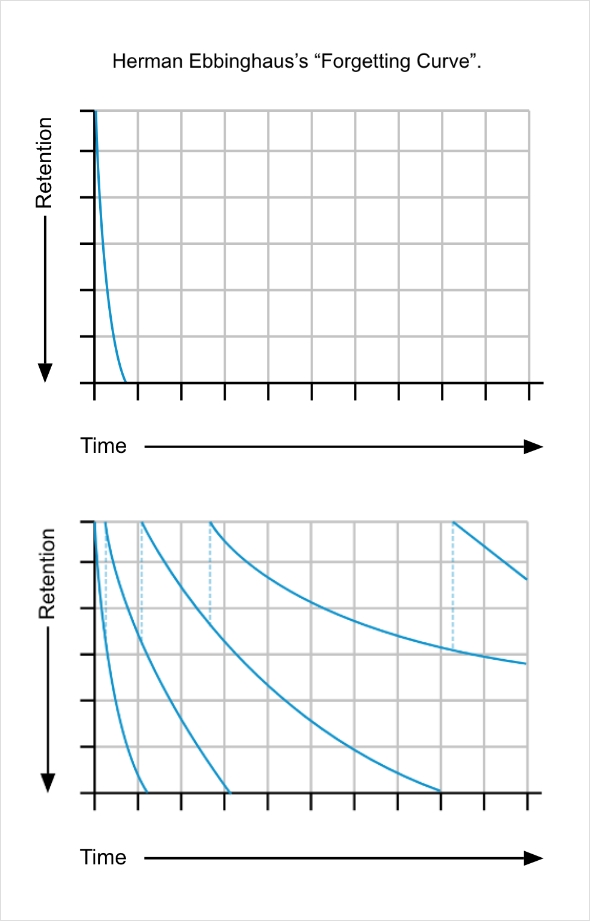
Ideally, learners should review the content before the curve dips. As this is difficult to do manually, educators can leverage e-learning platforms with adaptive technology and data analytics that automatically forecast when this would happen and send timely reminders to the learner to boost long-term memory.
Interleaving
In this technique, learners switch between related topics or concepts—versus focusing exclusively on one at a time (blocking)—to deepen memory building by learning to recognize patterns between different areas of knowledge. When they encounter similar topics, they are thus less prone to confusion or mistaking one concept for another11 but instead, develop a more holistic understanding of the overall topic.
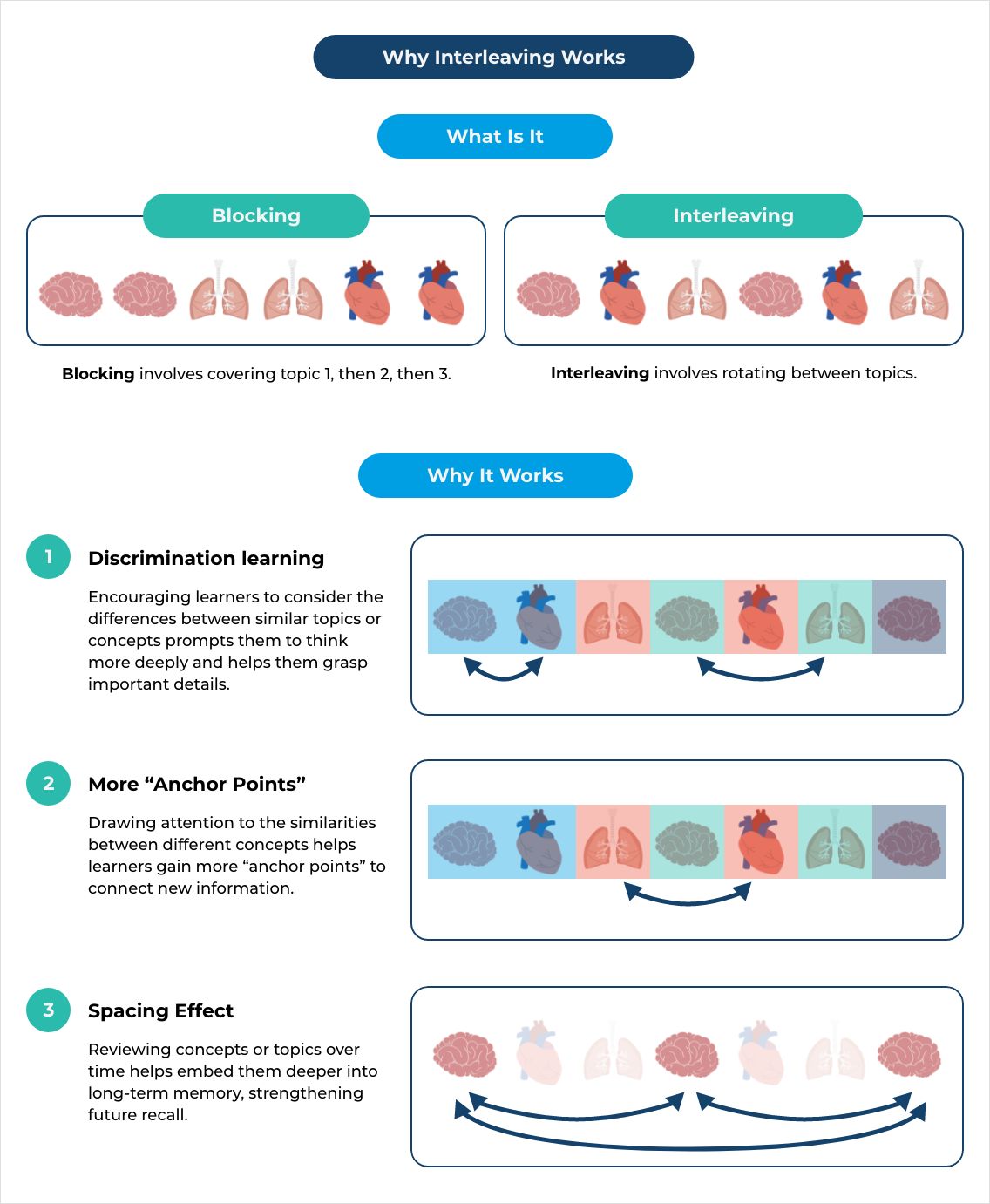

Using interleaving as a learning strategy has been found to help improve memory and knowledge retention12 as learners are not merely memorizing facts, but have to think about the information and apply what they learn. In a 2003 study,13 medical students who were trained on electrocardiogram (ECG) diagnoses using the interleaving approach had superior accuracy compared to students who were taught using the blocking method.
To teach through interleaving, educators start by explaining a topic and providing learners with the materials for it. Move on to a different, but related topic and do the same, then return to the previous topic. Repeating this process throughout a curriculum creates multiple opportunities for learning, deepening comprehension, and ultimately, developing mastery of concepts—in healthcare education, it is critical to establish a strong foundation of knowledge so that learners can develop higher-order thinking and clinical judgment skills, which are crucial for success on licensure exams and in future clinical practice.
Each of these strategies contributes to more effective and efficient learning and can be used in combination with each other to amplify the benefits. For example, one study that combined practice retrieval with spaced repetition among students on the subjects of anatomy and physiology found that they retained an average of 41% more of the material than the control group. By leveraging all three techniques, educators can help learners maximize the unlimited information storage capacity of their long-term memory, leading to enhanced academic performance and outcomes.
Discover How Learning Science Can Be Leveraged to Optimize Knowledge Acquisition and Retention Among Healthcare Learners
References
1 Roediger HL, Agarwal PK, McDaniel MA, McDermott KB. Test-enhanced learning in the classroom: long-term improvements from quizzing. J Exp Psychol Appl. 2011;17(4):382-395. doi:10.1037/a0026252
2 Researchgate.net. Accessed July 12, 2023. https://www.researchgate.net/publication/333030397_Powerful_Teaching_Unleash_the_Science_of_Learning
3 Roediger HL 3rd, Butler AC. The critical role of retrieval practice in long-term retention. Trends Cogn Sci. 2011;15(1):20-27. doi:10.1016/j.tics.2010.09.003
4 Rausch T, Mc Kenna K. Low stakes quizzing: A tool for practice not assessment. Eric.ed.gov. Accessed July 20, 2023. https://files.eric.ed.gov/fulltext/ED611620.pdf
5 Rowe MB. Wait time: Slowing down may be A way of speeding up! J Teach Educ. 1986;37(1):43-50. doi:10.1177/002248718603700110
6 Johnson DW, Johnson RT. Making cooperative learning work. Theory Pract. 1999;38(2):67-73. doi:10.1080/00405849909543834
7 Agarwal PK. Brain Dump: A small strategy with a big impact – Retrieval Practice. Unleash Learning. Published November 30, 2017. Accessed July 12, 2023. https://www.retrievalpractice.org/strategies/2017/free-recall
8 Ebbinghaus H. Memory: a contribution to experimental psychology. Ann Neurosci. 2013;20(4):155-156. doi:10.5214/ans.0972.7531.200408
9 Kang SHK. Spaced repetition promotes efficient and effective learning: Policy implications for instruction. Policy Insights Behav Brain Sci. 2016;3(1):12-19. doi:10.1177/2372732215624708
10 Wittman J, Stanislaus C. Csustan.edu. Accessed July 20, 2023. https://www.csustan.edu/sites/default/files/groups/Writing%20Program/forgetting_curve.pdf
11 Rohrer D. Interleaving Helps Students Distinguish among Similar Concepts. Published 2012. Accessed July 20, 2023. https://files.eric.ed.gov/fulltext/ED536926.pdf
12 Samani J, Pan SC. Interleaved practice enhances memory and problem-solving ability in undergraduate physics. NPJ Sci Learn. 2021;6(1):32. doi:10.1038/s41539-021-00110-x
13 Hatala RM, Brooks LR, Norman GR. Adv Health Sci Educ Theory Pract. 2003;8(1):17-26. doi:10.1023/a:1022687404380
14 Dobson JL. Retrieval practice is an efficient method of enhancing the retention of anatomy and physiology information. Adv Physiol Educ. 2013;37(2):184-191. doi:10.1152/advan.00174.2012
![How Educators Can Recognize and Help Students with Trauma [Webinar]](https://truelearn.com/wp-content/uploads/2020/11/Educator-Webinar-How-Educators-Can-Recognize-and-Help-Students-with-Trauma.png)
